For most people, a mortgage is the largest debt we take on in life.
This is where a mortgage broker is most useful, as we can negotiate the best solution from our current providers and help you structure your home loan for as much financial freedom as possible.
Banks and other financial institutions want your business. We understand their requirements and know how to negotiate, which maximises your chances of getting the best result.
If you’re thinking about buying a home, you can use our mortgage repayment calculator to work out the cost of your home loan repayments.
Remember, we’re financial specialists with access to all the banks and other lenders, so talk to us to get the best solution and rates on your home loan.
Mortgage calculator

Why choose us for your mortgage?
- In most cases, our mortgage broker services are free as we’re paid by the lender
- We’ll broker the best deal and interest rates
- We can restructure your loan if your circumstances change
- We’ll help you establish a good credit history
- If you have difficulty getting finance, we’ll find a solution
- We are members of Link Financial Group, giving us superior customer support with financial products
Mortgages for first homes
Saving up a deposit to buy your first home can be easier than you expect. If you have a KiwiSaver account, you’re allowed to access those funds for a first home. There are also other avenues you can take. Let us show you how to secure a mortgage for your first home.
Investments
Property remains one of the most popular ways that Kiwis make investments. Our mortgage brokers can show you the best way to structure your debt to maximise the long term benefits of your investment.
Refinancing
Interest rates change regularly, just like our income and living circumstances. You might need to free-up cash to cover an unexpected cost, pay off your mortgage sooner, or restructure your loan so it’s more manageable. Our mortgage brokers can get you the best deal.
New builds
Building a new home is an exciting time. Getting finance for a new build can be challenging and can influence what you can afford to build. Our mortgage brokers can help to get you the finance you need to start building your home.
Working with Stacey Crispin was an absolute game-changer for us. She took the time to understand our financial situation, helped us set clear short- and long-term goals, and provided invaluable guidance every step of the way. Her knowledge, patience, and support made the entire process feel easy and achievable. We now feel more confident and in control of our finances, and we couldn’t have done it without her! She went above and beyond and was a real joy to be around and work with. We will definitely work with her again.
Julia
You did it again Steve!
We would like to thank you once again for helping us and being patient in purchasing another property! All the best! More power to you.
Ryan and Josie
Stacey, we were so pleased to be given your name by a mutual acquaintance. Requiring a loan as you get older can be a challenge. You made our lending experience much easier and less stressful. Communication was above and beyond, keeping us informed every step of the way. The Cole Murray advice document was an added bonus. Very informative. “If you need a loan/mortgage Stacey’s definitely your girl.
Julie & Peter
Best mortgage broker I have dealt with, Tania goes above and beyond to help and makes the process so easy.
Lisa
I’d just like to thank you for all the advice and support you gave me and Carol over the last couple of years. Kind regards Peter.
Peter
I can’t recommend Mr. Steve Davies enough. I approached Steve about the possibility of obtaining a mortgage, given our very unique situation, expecting to be shrugged off (as I had been by multiple providers and brokers previously). Steve listened and did everything he could to get some traction on our application. He was able to secure a mortgage for us so that we could move ahead with our dream. I don’t think we would be here now if I hadn’t the good fortune to dial his number. Throughout the whole process, Steve’s communication was excellent. He was supportive, empathetic, and provided thoughtful, quality advice. Thank you for your mahi, Steve.
Anna
The exact amount depends on:
- Your income – including salary, bonuses, and other regular earnings
- Your expenses – monthly outgoings like loans, credit cards, and living costs
- Your deposit – larger deposits may mean you can borrow more
- Your credit score – a good credit history helps increase borrowing power
For an accurate assessment of how much you could borrow, speak with one of our Mortgage Advisers who can look at your individual circumstances and provide personalised advice.
Yes, absolutely! You can buy a house in New Zealand with as little as a 5% deposit. Many banks offer low deposit home loans, though you may need to meet additional criteria.
Here’s what you need to know:
- 5-20% deposits are accepted by most major NZ banks.
- First Home Loan scheme through Kāinga Ora helps eligible first-time buyers with just 5% deposit.
Don’t let a smaller deposit stop you from getting on the property ladder – speak with us to explore your options.
Yes you can, as long as you meet the following criteria:
- You have been contributing to KiwiSaver for at least 3 years.
- You have never owned a home or land before, either in New Zealand or overseas (in most cases).
- You must be planning to live in the home.
- You must live in New Zealand.
Although this might be an option for you, it will all depend on your situation if this is the right decision for you. Come and talk to one of our Mortgage Advisers and they can help you find the right solution for your situation.
You can learn more about using your KiwiSaver for a house deposit here.
Yes, you can often consolidate debts into your home mortgage through refinancing, but it’s not always the best option for everyone.
It is best for high-interest debts like credit cards, personal loans, or hire purchase agreements.
- Refinance your mortgage for a higher amount to pay out other debts.
- Lower interest rates – mortgage rates are typically much lower than credit cards or personal loans.
- Longer repayment terms can reduce your monthly payments.
You must consider:
- Turning short-term debt into long-term debt means paying more interest over time.
- Your home becomes security for all the consolidated debt.
- Banks will assess your ability to service the increased mortgage.
Our Financial Advisers can help you calculate whether debt consolidation through your mortgage makes financial sense for your situation.
We wish we had the answer to this. But unfortunately, it would require a crystal ball.
Interest rates are influenced by many economic factors including inflation, employment, and global conditions. Floating rates mainly follow what’s happening in New Zealand’s economy through the Reserve Bank’s OCR. Fixed rates are influenced by both New Zealand’s economic conditions and what’s happening in global financial markets, since banks get some of their funding from overseas sources.
While rates have been coming down from recent highs, predicting exactly how low they’ll go is a challenge even for economists. The speed and how much they will change depends on economic data and the Reserve Bank decisions.
Come and talk to us for specific guidance on timing major financial decisions. Our Mortgage Advisers can assess your individual situation and work out what is best for you.
Yes, you can get a mortgage with bad credit, though it will be more challenging.
Come and talk to one of our Mortgage Brokers. Your “bad credit” might not be as bad as you think. They can help you determine your credit rating then advise which lenders could be right for you. They also work with non-bank lenders who may be more flexible than major banks.
Expect to:
- Save a larger deposit (potentially more than the standard 20%)
- Pay higher interest rates initially
- Demonstrate improved payment habits over 6-12 months
There are things you can do to improve your chances:
- Pay all bills consistently on time for at least a year
- Check your credit report for errors
- Consider reducing other expenses to build a bigger deposit
While challenging, many Kiwis with bad credit do successfully secure home loans. By getting financial advice and actively trying to improve your credit rating, you may be able to as well.
Yes, keeping your current home as a rental property when buying a new one is definitely an option, but there are important considerations to think about.
You’ll need to qualify for your new mortgage while carrying both properties. It depends on how much equity you have in your current house on how much deposit you will need for your new property.
From a tax perspective, rental income is taxable but you can claim expenses like rates, interest, insurance, and maintenance. You’ll need to consider the bright-line test for capital gains and ensure compliance with Healthy Homes Standards for rentals.
You’ll need to decide if you are going to manage the rental yourself, or get a property manager, you will need to change your insurance to landlord cover, and understand your obligations under tenancy law.
Come and talk to one of our Mortgage Advisers about financing both properties to ensure it makes sense for you and your situation. Talking to an accountant is also recommended for the tax implications.
